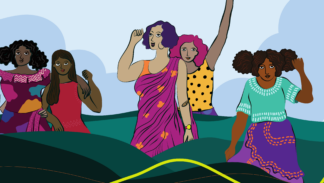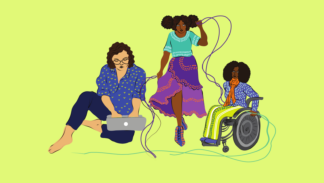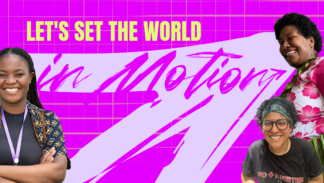Backlash against women’s rights: A missive from our Europe & Central Asia Activist Convening
[Editor’s Note: Because of security threats in the region, which are discussed in this article, names and identifying attributes of the activists quoted in this piece have been altered or concealed in order to protect their identities.]
Last week, Global Fund for Women brought together 85 activists from sister organizations and women’s funds in Europe & Central Asia for a meeting in Batumi, Georgia. The meeting was part of Global Fund for Women’s ongoing work to strengthen and build connections between local movements for women’s rights.
“The Europe and Central Asia Activist Convening brought together activists and women’s funds from very diverse backgrounds,” explains Mariam Gagoshashvili, Global Fund for Women’s Program Officer for Europe and Central Asia. “Yet it was very important to realize that the external and internal challenges these movements are facing are common ones and that we need to unite to counter them.”
One of the key challenges discussed at the meeting is the growing backlash against women and trans* human rights defenders and social change activists in the region. In countries including Azerbaijan, Uzbekistan, Belarus, Kazakhstan, and Tajikistan, just to name a few, organizations working on human rights—especially around gender, sexual orientation, or reproductive rights—are being increasingly targeted and threatened.
For many of the women in Batumi, the very act of traveling to the convening posed severe security threats. Some shared stories of the harassment and interrogation they would face when they traveled back to their home countries—still emphasizing that the opportunity to be there and exchange strategies and stories with other activists throughout the region was worth it.
“When I return to my home, I will be invited to the police office, I will be fingerprinted, and I will be sent to the HIV office,” shared one activist. “I will be interrogated to find out where I went and why I went and how I went.”
Shrinking space for activism
In Europe and Central Asia, in recent years, grass-roots women-led organizations have worked hard to organize movements, make their voices heard in public conversations around gender equality, and to drive positive shifts in culture.
But, as the activists convened in Batumi highlighted, for every positive shift, there have been strong resistant reactions.
“Over five years working with and uniting women’s organizations, the government was not paying much attention because they did not view us as people who would be able to do anything meaningful,” explained one activist from the North Caucasus who has been working in the region for nearly a decade. “When we became more active and were showing more achievements, protecting women in courts, having tangible results—then the government didn’t want to lose control. So they started attacking us.”
The safety and security of women’s rights and LGBTQI activists in the region is a growing concern, with many highlighting growing threats, violence, and harassment.
“In Central Asia, we cannot say one [country] is better than one or the other,” said one activist from Central Asia. “My country is not free at all, there is no freedom. There are dictators strongly controlling Central Asia, using biometric data, drones, video surveillance, digitalization of our communication.”
Regional impact of Russia’s “Foreign Agent” law
According to many of the activists at the convening, Russia’s political situation has driven an environment in the region that criminalizes dissent, targeting human rights activists. They highlight that Russia’s influential policies have made it nearly impossible for foreign funders to support activists’ work in the region financially.
In 2012, Russia passed the so-called “Foreign Agent” law requiring non-governmental organizations (NGOs) to register with the Justice Ministry as “foreign agents” and to file a report to officials every quarter. Many human rights organizations, including women’s groups, are considered “foreign agents” under the law, because they receive funding from international sources.
In addition, a more recent law passed in May 2015 gives authorities the right to identify “undesirable” foreign organizations that they believe pose threats to Russia’s “defense capabilities, security, or public health. This law adds the potential for high fines, jail time, and restriction on movement for NGOs, as well as other organizations.
Many of the activists gathered in Batumi expressed concern that the “Foreign Agent” law adopted in Russia intends to weaken the civil society space, and force international organizations and foundations to leave the country. Many other countries in the region are following Russia’s lead: “foreign agent” bills have been proposed in Kyrgyzstan, Tajikistan, Kazakhstan, and Azerbaijan.
“Russia tries to play the role of big brother and extend its influence in Azerbaijan,” explained one activist from Azerbaijan, where women’s human rights defenders are especially outspoken about the grave human rights violations committed by the government, including the illegal imprisonment of hundreds of activists. “Women activists are experiencing radical threats—even their bank accounts have been frozen.”
Beyond Azerbaijan, women’s human rights defenders in Belarus, Uzbekistan, Turkmenistan, and the Russian North Caucasus are experiencing increased harassment by authorities in the form of surveillance, financial audits, criminal charges, and barriers to receiving funding.
Global Fund for Women grantee partners in the Republic of Chechnya, which is in the Russian North Caucasus, have undergone severe government audits and several of them have received official notices with the request to register as “foreign agents”, which note that the failure to do so will result in the large fines.
“The influence of Russian policies and ideology is very strong, so the laws are becoming more strict, and we’re seeing more censorship and propaganda,” explained an activist from Central Asia.
Harassment and attacks threaten safety and physical security
In addition to state harassment, human rights activists are experiencing attacks from nationalist extremists and religious fundamentalists across the region.
“The Church in Georgia is very influential and many politicians and parliamentarians support the church,” explained Ekaterine Aghdgomelashvili, a LGBTQI activist from the Women’s Initiative Supporting Group, a long-time Global Fund for Women grantee partner. “Our work is being stripped back to physical existence rather than advancing human rights.”
Activists shared painful stories of threats, harassment, and physical attacks in recent years. In Kyrgyzstan, our grantee partners’ office was attacked with handmade explosives with the intention to set it on fire in the spring of 2015. In Georgia, less than 100 LGBTQI human rights defenders were violently attacked on a peaceful march in 2013 by—reportedly—20,000 counter-protesters led by the clergy. Throughout the last year in Serbia, extreme right-wing groups have repeatedly attacked peaceful demonstrations of a grantee partner that is leading the women’s peace movement in the Balkans.
In addition to physical attacks, activists have experienced online attacks and digital security threats from fundamentalists and right-wing extremists. These digital attacks have included hacking their websites and emails, sending hate mail and online threats, and “outing” their plans and identities. In Armenia, one extremist group published “black lists” online and in print media, calling for violence towards women’s human rights defenders.
Sharing strategies for moving forward
Amid discussions of the common threats and increased scrutiny, the activists gathered in Batumi were committed to working together to find solutions and try to change the environment that criminalizes human rights activism across the region.
One activist emphasized the importance of security, and many agreed. “Women’s groups need to make security a daily practice and not just a training,” she said. “The laws are designed to lock us up or force us out of the country. We cannot let that happen.”
Others expressed the importance of solidarity and making sure women activists feel connected, supported, and protected. Many activists highlighted that women’s human rights defenders need legal support and training, and women’s groups in the region with legal expertise are providing legal services to activists that need it—free of charge. Activists brainstormed ideas for making women’s voices heard at other public forums and in the media, and exchanged ideas for setting up more safe spaces for activists.
For nearly all of the activists in Batumi, the lack of funding is the most urgent issue arising out of the growing backlash against human rights organizations. They discussed ideas for greater collaboration between organizations in order to mobilize resources to continue their work. Many emphasized that donors and funders need to be flexible with their funding to allow them to achieve and build on gains to push against the backlash.
“When we’re trusted by funders it gives us more power and extends our opportunities,” said one activist from the Russian North Caucasus, who shared a story of flexible funding that recently allowed one women’s group in the region to win all 14 of the cases they brought to court to protect women’s human rights defenders who were being wrongfully charged.
“Now more than ever, given the growing climate of fear and the backlash against women’s rights activism in Europe and Central Asia, we need more donors to support and trust women’s groups in the region with flexible and long-term funding,” explains Jane Sloane, Global Fund for Women’s Vice President of Programs who was part of the convening of activists in Batumi.
While the growing backlash in Europe and Central Asia undermines the sustainability of movements for gender equality and human rights, the activists who gathered in Batumi are more committed than ever to fight against it, drive meaningful social change, and work together to advance human rights throughout the region.
“We have to work on addressing the backlash,” says Ekaterine Aghdgomelashvili, who highlighted the need to get to the roots of the backlash against social change. “The changes to which we aspire cannot happen overnight—this is daily work, a daily process.”
Our work is being stripped back to physical existence rather than advancing human rights. ”Ekaterine Aghdgomelashvili


